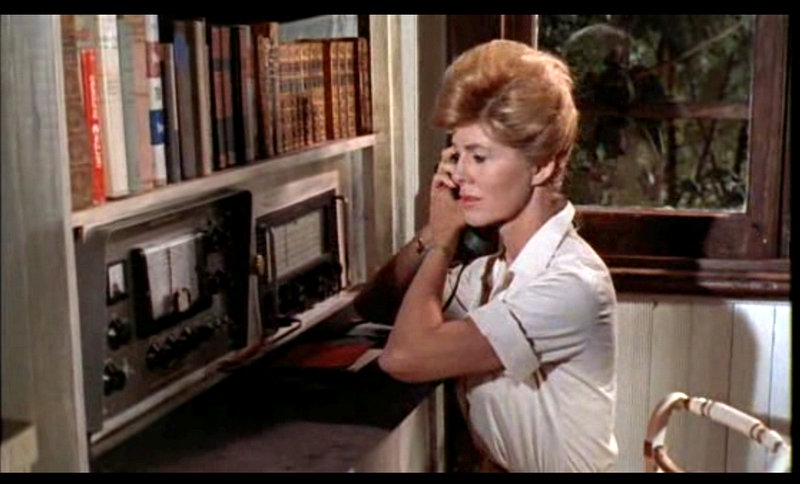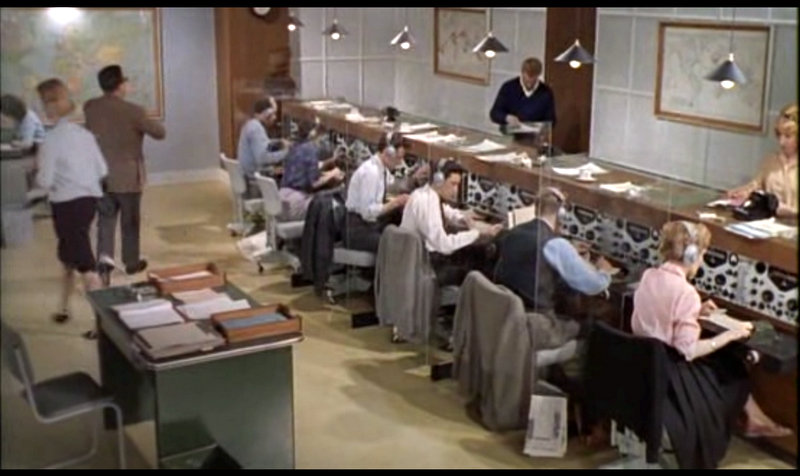Many thanks to SWLing Post contributor, Patrick, who writes:
Many of us have more time during the holiday season to watch good old movies on either streaming services or just old-time DVD. My favourite pastime is to watch James Bond movies, based on the books by Ian Fleming. The iconic British agent in Her Majesty’s service offers insights to technical advancements in different areas.
The other night I was wondering if the fictional character was a licensed ham radio operator and a shortwave listener? First, let me say that he most likely had advanced techniques to master radio communications in several aspects, among them most likely amateur radio and listening to shortwave broadcasts.
In the first movie, Dr. No, (1962), the presence of ham radio or shortwave radio communications is most present, as noted by the SWLing Post blog and we can also get a glimpse of what could be the BBC Monitoring Station. The matter is also discussed by Dr. Bob Heil (K9EID) on YouTube:
But even in other James Bond movies there are different forms of radio communications. In the 1979 movie Moonraker, James Bond confronts the Dr. Holly Goodhead in Venice, Italy, by taking her purse at 01.12.15 in the movie and concludes in what seems to be a shortwave radio with morse that it is standard CIA equipment.
As a commander in the Royal Navy, James Bond would know morse code as well as several aspects of shortwave band. Both at sea but also in his duties as a Secret Service agent operating abroad he most likely listened to BBC World Service and British military radio stations, numbers stations among them, Although we do not know if he carry with him a shortwave receiver or a very small shortwave transceiver. The innovative character of Q probably equipped him with the latest technology.
In the opening scenes of the 1985 movie A View To A Kill James Bond traced a signal with a gadget that looks like a typical yellow Sony Walkman and in the movie The Spy Who Loved me (1977) James Bond receives a message on his watch what seems to be a tape coming out from the watch, telling him to contact the Headquarters.
In the movie Thunderball (1965) at 00.56 James Bond enters a room where a radio operator listening till BBC Overseas programme is listening to a news bulletin with a coded message that Big Ben had strike seven times at six o’clock.
This is fun, Patrick–thanks so much for sharing! Without a doubt, in real life, Cold War era spies used the shortwaves heavily for both receiving and sending coded messages. Indeed, we believe foreign operatives still use the services of numbers stations.
Your message is so timely: I’ve heard from both family and friends recently who are on a bit of a James Bond binge!



The British diplomatic service had a large HF radio operation. I knew a radio amateur who had been stationed in embassies as a radio operator. Many radio amateurs worked at GCHQ and related operations. One of my friends when I was a young radio amateur went into the intelligence service MI5.
Mr. Black, loosen your collar. It supposed to be fun and interesting.
Considering “cold War” history my not be your bag, but I lived through most of the Cold War.
Every covert agent in the era HAD to know Morse code, it was and still is used for covert operations outside amateur bands. As such, one veteran of WW II that I knew quite well could still copy accurately at 80 to 90 words a minute. He got an amateur license. He enjoyed the amateur hobby a great deal before his passing
There’s no reason an agent trained in Morse would give up a hard earned learned skill that could save his life on a covert operation. And to be able to use it in a hobby, all the better.
Have fun with it and quit starching your shirt collars with brick dust.
73! de AA4PC
John
Fun and interesting is great, but not at the cost of accurate. This is speculation, but we can at least speculate based on what’s likely rather than what suits our existing stereotypes. For example, it’s possible that a person learned Morse during the cold war, but much more likely to have learned it during World War II. The reasons have already been stated, but the short version is that agents frequently had to parachute into occupied countries and receive information via radio, whereas agents in the cold war didn’t necessarily need to go to such extents because they weren’t about to get shot on sight.
I don’t know all the Bond canon, but I have no information suggesting that he operated behind enemy lines and needed those skills. Had Bond been employed by an intelligence service during the war operating from Britain, he wouldn’t have had to learn Morse as he’d likely pass messages off to cryptographers and transmitters after deciding what they said. While not out of the question, it’s not something you can assume unless you have a predetermined conclusion (it appears you might). Similarly, someone can know how to use radio and not want to do it as a hobby. Try explaining why you like amateur radio to people who don’t and you’ll see that many of them think it’s really boring; if they had to learn how to do it for a job, they could, but they might still think it was boring enough that they wouldn’t want to do it after work too.
We can assume anything about what Bond might have done or liked. He could think that radio design was a great way to spend the time between plotting the downfall of enemy nations. Or he could have considered it an uninteresting part of his job. Or he could have hated it so badly he outright refused to do anything more complex than pressing transmit and talking. The only way to figure out how much connection he actually had is to examine what we’ve seen in the books and movies. While I have not watched them as closely as others have, when I’m told that Bond hasn’t been seen using radios or Morse or receiving them from Q, I’m inclined to believe that’s not made up. It would be a lot more fun to discuss what actually happened, not what we would like to see. I’m sure if you could show me a scene where Bond was seen showing an interest in radio, it would be more rewarding than arguing how theoretically he probably could have and well it’s interesting so he must have agreed so he did even though he never showed us or told us about it.
Looks like the YL is operating an Eddystone receiver…. and as noted , the other piece of gear is Geloso (a transmitter and receiver pair I’ve always wanted to own/operate) as Andrew notes.
as for the Geloso, here
http://air-radiorama.blogspot.com/2013/12/linea-geloso-vintage-g209-r-g212tr.html?m=1
you can see the G209 receiver and the G212TR transmitter, from the pic I can’t tell if the one jn the movie was the 209 or the 212
also see
http://www.geloso.net/
🙂
Heyerdah’s radio was (of all things) a NC 183 IIRC. You’d have to look long and hard to find a bigger , less portable radio for an ocean operation. 🙂
No, this was RA II, about 1970. A specially.modified Heathkit SSB rig.
The January 1972 issue of Electronics Illustrated has an article about it.
Since I just looked it up, it turns out Thor Hyerdahl was trained as an agent in WWII, and parachuted behind enemy lines. But he haged it, so he wanted little to do with radios.
National NC-173
just in case, the leftmost receiver in the pic should be an Italian “Geloso G-209”
https://www.radiomuseum.org/r/geloso_g_209_r.html
https://youtu.be/-X0ek_EXlz8
I had one of them… many many years ago…
Just because shortwave is used in the James Bond films doesn’t make him a ham or hobby listener.
In Dr. No, it’s the agent in Jamaica that has the station.
Bond was never issued radios by Q, at least not on screen.
In WWII, agents were equipped with radios when sent into enemy territory, because their job was iften to gain information, and they had to get it out. Or they were sent as liaisons to existing resistance.
Bond was never like that, an imaginary and very different type of agent.
Much of the time he had access to regular communication. Maybe he had to code his messages, but phone and telegrams blend in way more than a rogue transmitter.
Thor Heyerdahl’s RA II expedition, he had someone on board who had been an agent in WWII, but it was so traumatic that the radio had to be modified for easier use.
I suslect that’s James Bond too, radio because of his job but no hobby interest.
I’ve never seen mention of Ian Fleming being a ham, and his intelligence work was organizing